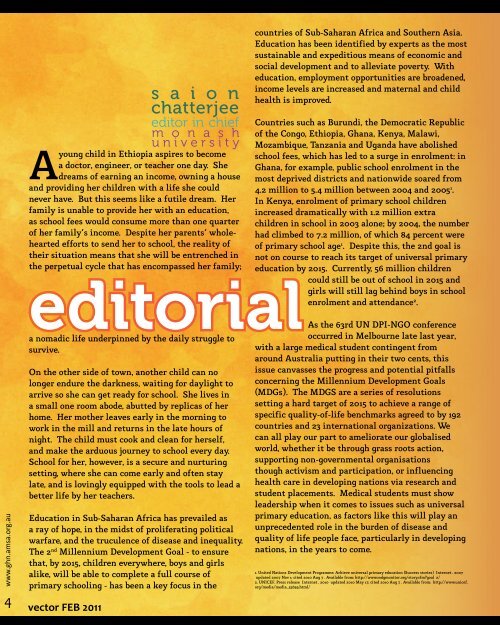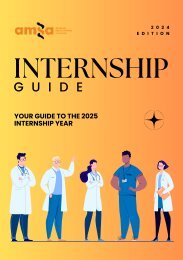You also want an ePaper? Increase the reach of your titles
YUMPU automatically turns print PDFs into web optimized ePapers that Google loves.
www.ghn.amsa.org.au<br />
4<br />
A<br />
young child in Ethiopia aspires to become<br />
a doctor, engineer, or teacher one day. She<br />
dreams of earning an income, owning a house<br />
and providing her children with a life she could<br />
never have. But this seems like a futile dream. Her<br />
family is unable to provide her with an education,<br />
as school fees would consume more than one quarter<br />
of her family’s income. Despite her parents’ wholehearted<br />
efforts to send her to school, the reality of<br />
their situation means that she will be entrenched in<br />
the perpetual cycle that has encompassed her family;<br />
editorialcould still<br />
a nomadic life underpinned by the daily struggle to<br />
survive.<br />
On the other side of town, another child can no<br />
longer endure the darkness, waiting for daylight to<br />
arrive so she can get ready for school. She lives in<br />
a small one room abode, abutted by replicas of her<br />
home. Her mother leaves early in the morning to<br />
work in the mill and returns in the late hours of<br />
night. The child must cook and clean for herself,<br />
and make the arduous journey to school every day.<br />
School for her, however, is a secure and nurturing<br />
setting, where she can come early and often stay<br />
late, and is lovingly equipped with the tools to lead a<br />
better life by her teachers.<br />
Education in Sub-Saharan Africa has prevailed as<br />
a ray of hope, in the midst of proliferating political<br />
warfare, and the truculence of disease and inequality.<br />
The 2 nd Millennium Development Goal - to ensure<br />
that, by 2015, children everywhere, boys and girls<br />
alike, will be able to complete a full course of<br />
primary schooling - has been a key focus in the<br />
vector FEB <strong>2011</strong><br />
s a i o n<br />
chatterjee<br />
editor in chief<br />
m o n a s h<br />
university<br />
countries of Sub-Saharan Africa and Southern Asia.<br />
Education has been identified by experts as the most<br />
sustainable and expeditious means of economic and<br />
social development and to alleviate poverty. With<br />
education, employment opportunities are broadened,<br />
income levels are increased and maternal and child<br />
health is improved.<br />
Countries such as Burundi, the Democratic Republic<br />
of the Congo, Ethiopia, Ghana, Kenya, Malawi,<br />
Mozambique, Tanzania and Uganda have abolished<br />
school fees, which has led to a surge in enrolment: in<br />
Ghana, for example, public school enrolment in the<br />
most deprived districts and nationwide soared from<br />
4.2 million to 5.4 million between 2004 and 2005 1 .<br />
In Kenya, enrolment of primary school children<br />
increased dramatically with 1.2 million extra<br />
children in school in 2003 alone; by 2004, the number<br />
had climbed to 7.2 million, of which 84 percent were<br />
of primary school age 1 . Despite this, the 2nd goal is<br />
not on course to reach its target of universal primary<br />
education by 2015. Currently, 56 million children<br />
be out of school in 2015 and<br />
girls will still lag behind boys in school<br />
enrolment and attendance 2 .<br />
As the 63rd UN DPI-NGO conference<br />
occurred in Melbourne late last year,<br />
with a large medical student contingent from<br />
around Australia putting in their two cents, this<br />
issue canvasses the progress and potential pitfalls<br />
concerning the Millennium Development Goals<br />
(MDGs). The MDGS are a series of resolutions<br />
setting a hard target of 2015 to achieve a range of<br />
specific quality-of-life benchmarks agreed to by 192<br />
countries and 23 international organizations. We<br />
can all play our part to ameliorate our globalised<br />
world, whether it be through grass roots action,<br />
supporting non-governmental organisations<br />
though activism and participation, or influencing<br />
health care in developing nations via research and<br />
student placements. Medical students must show<br />
leadership when it comes to issues such as universal<br />
primary education, as factors like this will play an<br />
unprecedented role in the burden of disease and<br />
quality of life people face, particularly in developing<br />
nations, in the years to come.<br />
1. United Nations Development Programme. Achieve universal primary education (Success stories) [Internet]. 2007<br />
[updated 2007 Nov 1; cited 2010 Aug 7]. Available from: http://www.mdgmonitor.org/story.cfm?goal=2/<br />
2. UNICEF. Press release [Internet]. 2010 [updated 2010 May 17; cited 2010 Aug 7]. Available from: http://www.unicef.<br />
org/media/media_53659.html/

















